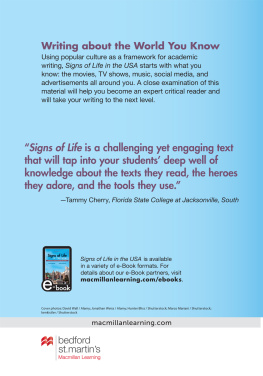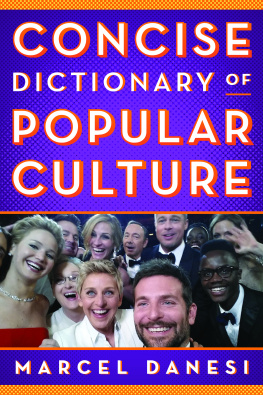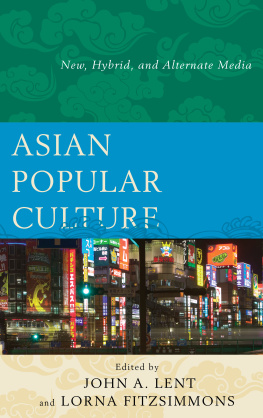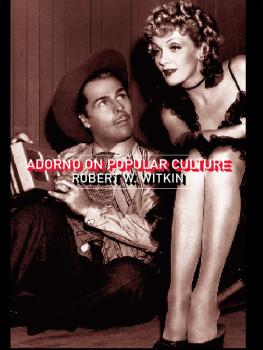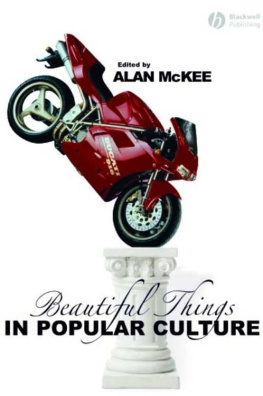Published by State University of New York Press, Albany
2016 State University of New York
All rights reserved
Printed in the United States of America
No part of this book may be used or reproduced in any manner whatsoever without written permission. No part of this book may be stored in a retrieval system or transmitted in any form or by any means including electronic, electrostatic, magnetic tape, mechanical, photocopying, recording, or otherwise without the prior permission in writing of the publisher.
For information, contact State University of New York Press, Albany, NY
www.sunypress.edu
Production, Eileen Nizer
Marketing, Anne M. Valentine
Library of Congress Cataloging-in-Publication Data
Names: Delaney, Tim. | Madigan, Tim.
Title: Lessons learned from popular culture / Tim Delaney and Tim Madigan.
Description: Albany : State University of New York Press, 2016. | Includes bibliographical references and index.
Identifiers: LCCN 2015036579 | ISBN 9781438461458 (hardcover : alk. paper) | ISBN 9781438461465 (pbk. : alk. paper) | ISBN 9781438461472 (e-book)
Subjects: LCSH: Mass media and cultureUnited States. | Popular cultureUnited States.
Classification: LCC P94.65.U6 D47 2016 | DDC 306.0973dc23
LC record available at http://lccn.loc.gov/2015036579
10 9 8 7 6 5 4 3 2 1
Preface
The world of popular culture not only entertains us and reflects our cultural values and norms, it provides valuable life lessons. Lessons Learned from Popular Culture is filled with a number of short stories from the world of popular culture, each of which concludes with a Lesson Learned offering from the authors. The Lesson Learned concept serves as a brief, generally one-sentence moral of the story type of explanation for each popular culture story. In other words, what we hope the reader learned from the story. We do, however, encourage readers to come up with their own lessons learned following each story and compare them to ours and their friends. Because this is a book on popular culture and written to be as entertaining as it is informative, the authors lessons tend to be brieflike a Final Thought to wrap up the story. People who are good storytellers do this in everyday life; that is to say, they tell a story to their friends or family members and then offer a final thought, like a punch line designed to make people laugh, smile, or think about what was just said. In this regard, the Lesson Learned statements provide the reader with an opportunity to reflect on the story told. Its like a ribbon on a present.
The lessons provided by the authors are generally meant to be funny and at times a bit sarcastic as well. For example, the Lesson Learned about the Sharknado craze provided at the end of (If Apes Evolved Instead of Humans), the Lesson LearnedAs the Law of Unanticipated Consequences warns, the testing of experimental drugs on apes may alter the natural evolutionary processinvolves a deeper message on such topics as experimental drug testing on animals, genetic research, the evolutionary process, and the Law of Unanticipated Consequences itself. It is the hope of the authors that readers may actually take the time to look up the Law of Unanticipated Consequences for themselves, if they wish to learn more about this topic.
The idea of learning life lessons from popular culture is not a new one. In fact, representatives of popular culture themselves often attempt to provide a life lesson. Consider, for example, the 2014 season finale of The Simpsons (Yellow Badge of Cowardge) when Homer Simpson states, If the Expendables movies taught us anything, people do their best after theyre old and forgotten. Homers statement manages to both slam the Expendables movies because of their perceived lack of quality, while also offering hope that if Sylvester Stallone, Dolph Lundren, and Steve Austin can keep on making action films when theyre eligible for AARP membership, then theres hope for all of us.
During his May 21, 2014, opening monologue of The Jimmy Kimmel Show , Kimmel described the incredible journey of Dancing with the Stars contestant Amy Purdy. Purdy was competing under a seemingly insurmountable handicap as she had lost both her legs as a teenager after contracting meningitis (Griffith 2014). Purdy and her dance partner Derek Hough reached the finals of the dancing contest but lost to Meryl Davis, a gold medal Olympian ice dancing skater and her Dancing with the Stars partner Maksim Chmerkovskiy. The results led Kimmel to offer this life lesson: Even if you lose both of your legs, if you work hard and believe in yourself, you can almost achieve your dreams. Clearly, this sarcastic attempt at humor was designed to applaud people who attempt to overcome challenges while implying that nevertheless, in most cases, people should maintain realistic goals and aspirations.
In their Lesson Learned statements, the authors utilize the same approach as the Homer Simpsons and Jimmy Kimmels of the world; that is to say, we will provide a lesson at the end of each story and leave it at that. It is up to the reader to figure out the meaning of the statement. In most cases, the meaning of the lesson should be quite clear, while in other cases, figuring out the meaning behind the authors words involves a hermeneutic approach. Hermeneutics is a special approach to the understanding and interpretation of published writings, with its goal to understand both the basic structure of the text as well as the thinking of the author (Pressler and Dasilva 1996; Delaney 2014). When utilizing a hermeneutic interpretation of published writings the reader comes to understand, for example, that seemingly vague and generalized statements may have a specific meaning to the author.
Perhaps the most noteworthy examples of popular culture offering life lessons come from fairy tales. Fairy tales, short stories that in our culture typically feature characters taken from European folklore, provide the concept of: the moral of the story (via their happy endings) at the end of each short story. Little Red Riding Hood learned a lesson about the dangers of talking to strangers, and the Three Bears not to leave their doors open to thieving little girls. Each of the stories presented in this book concludes with the authors offering a lesson learned based on their insights from their observations and participation in popular culture.
The authors hope you will enjoy Lessons Learned from Popular Culture and come to view popular culture itself in a slightly different manner, as it has cultural value beyond its initial entertainment face value. Popular culture is a good means to confront, in a harmless way, the many issues that can otherwise overwhelm us. Perhaps the main lesson to learn is that life would be pretty dull without the diversions and attractions that popular culture provides to us all.
Acknowledgments
The authors would like to thank the anonymous reviewers of the early drafts of this publication; we appreciate your input. We would also like to thank Michael Rinella and Rafael Chaiken of SUNY Press for your assistance throughout the review and acquisitions process. In addition, wed like to thank Eileen Nizer, our Production Editor, and the anonymous copyeditor, for all their hard work.




